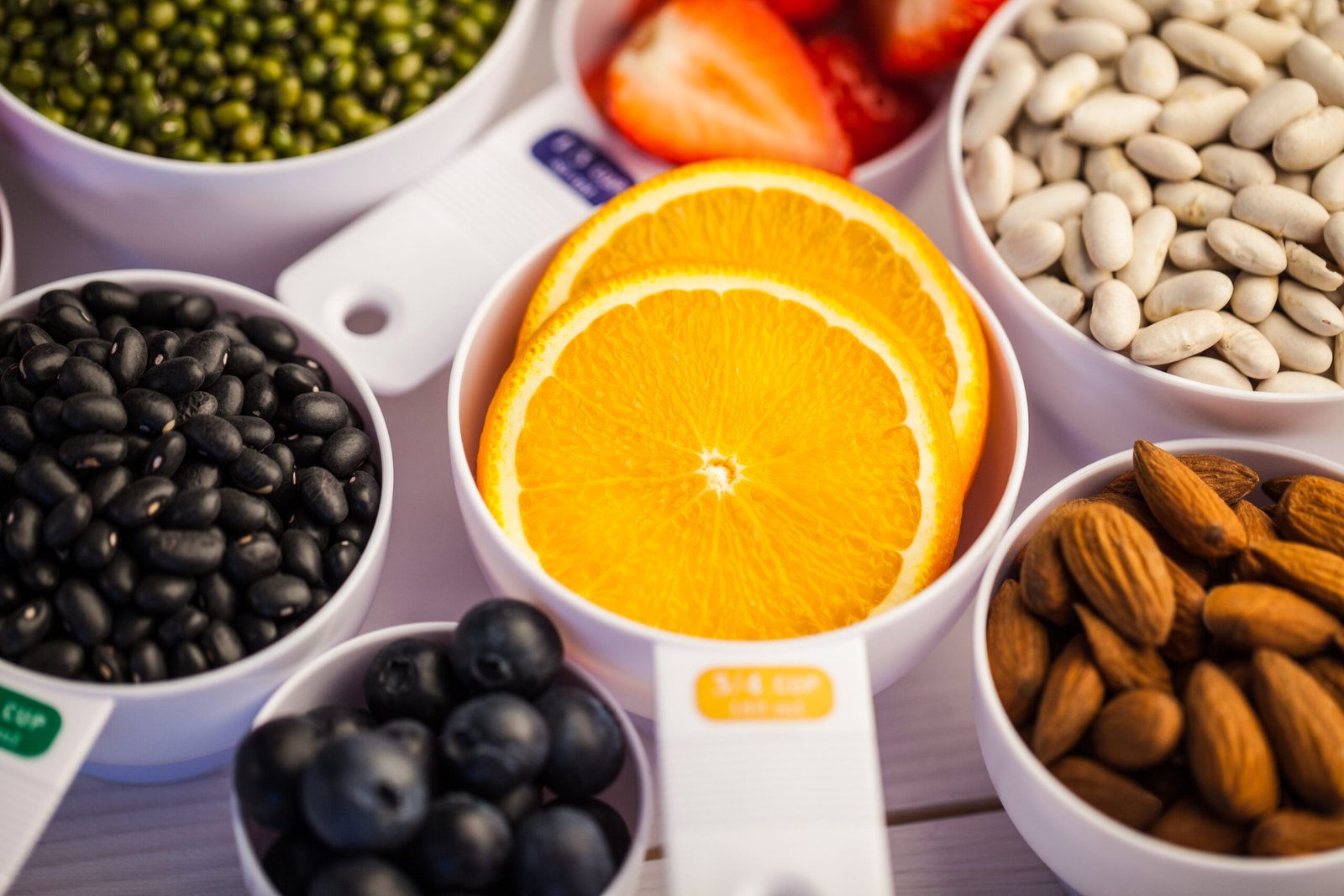For anyone immersed in the world of strength training, the power of nutrition can never be overstated. The Role of Nutrition in Strength Training: Fueling Your Workouts for Optimal Gains is not just about what ends up on your plate, but about structuring a strategic diet that supports high-intensity workouts and muscle development. As you explore further, you’ll uncover how eating can be more than just satisfying hunger; it can be a meticulously planned part of your fitness strategy to maximize muscle growth and achieve your workout goals.
Eat to Gain Muscle—The Role Food Plays in Strength Training
| Macronutrient | Role in Muscle Growth | Recommended Intake | Sources |
|---|---|---|---|
| Protein | Supports muscle repair and growth; helps build muscle fibers | 1.6–2.2g per kg of body weight | Chicken, turkey, fish, eggs, tofu, legumes |
| Carbohydrates | Primary energy source; replenishes glycogen stores for workouts | 3–6g per kg of body weight | Whole grains, sweet potatoes, quinoa, oats |
| Healthy Fats | Supports hormone production (e.g., testosterone); aids recovery | 0.8–1g per kg of body weight | Avocados, nuts, seeds, olive oil |
Proper nutrition is the cornerstone of effective strength training. When you lift weights or perform resistance exercises, your muscles undergo stress and require nutritional support to repair and grow stronger. Protein consumption is at the forefront, as it helps repair and construct new muscle fibers. Carbohydrates are equally important, as they replenish the energy stores depleted during strenuous exercise sessions. Additionally, healthy fats are crucial for hormone production, particularly testosterone, which is intimately linked to muscle growth and recovery. Timing your meals and nutrient intake can yield significant impacts on workout efficiency and overall results.
– Protein: Supports muscle repair and growth.
– Carbohydrates: Provide energy to power through workouts.
– Healthy fats: Essential for hormone production and muscle recovery.
– Meal timing: Can enhance workout performance and results.
Understanding these basics will empower you to make informed food decisions that fuel your strength training efforts.
How Knowing What to Eat to Gain Muscle Leads to Better Results
Grasping the essentials of nutrition for muscle gain sets the stage for more effective workouts and superior results. Fueling your body with the right balance of macronutrients provides energy, facilitates muscle repair, and supports overall growth. Protein intake is particularly vital, as it is directly involved in muscle protein synthesis and recovery. Carbohydrates, on the other hand, serve as a primary energy source, sustaining you through intense strength training sessions, allowing you to push your limits.
– Macronutrient balance: Fuel workouts and aid in muscle repair.
– Protein: Essential for synthesis and recovery.
– Carbohydrates: Sustain energy during training.
– Healthy fats: Help maintain hormonal balance and support muscle development.
By understanding what to eat, you tailor your diet to not only meet the demands of strength training but elevate your performance and results.
How Much to Eat When Building Muscle
Calculating the requisite caloric intake for muscle building starts with determining your total daily energy expenditure (TDEE). To gain muscle, you need to consume a surplus of calories—enough to support growth while ensuring exercise performance isn’t compromised. A balanced diet rich in protein, healthy fats, and carbohydrates ensures your body has the nutrients needed to power workouts and aid muscle recovery. Protein remains a focal point, typically ranging between 1.6 to 2.2 grams per kilogram of body weight, to effectively support muscle building.
– Caloric surplus: Essential for muscle growth.
– Balanced diet: Rich in protein, fats, and carbs for optimal nutrition.
– Protein intake: 1.6 to 2.2 grams per kg of body weight.
– Meal frequency: Distribute calories across the day to maintain energy and recovery.
– Monitor progress: Adjust intake based on weight, muscle mass, and training changes.
Tailoring your caloric and nutrient intake supports continued muscle development and workout effectiveness, adjusting as necessary for consistent progress.
Protein—The Dietary Building Block for Muscle Growth
| Factors to Consider | Protein Intake Range | Sources |
|---|---|---|
| Training Intensity | 1.6–2.2 grams per kg of body weight | Lean meats, dairy products, eggs, legumes |
| Age | Younger adults may require higher intake (closer to 2.2g) | Chicken, turkey, tofu, plant-based protein options |
| Gender | Males may benefit from slightly higher intake than females | Fish (e.g., salmon, tuna), quinoa, soy protein |
Protein’s role as the bedrock of strength training nutrition cannot be understated. It serves as the fundamental building block for muscle repair and growth, ensuring your workouts yield maximum gains. Consuming adequate protein not only fosters recovery but also reduces post-workout soreness, allowing for more consistent training. High-quality protein sources such as lean meats, dairy products, and plant-based options provide the essential amino acids necessary for muscle synthesis.
– Muscle repair and growth: Protein’s central roles.
– Soreness reduction: Helps in faster recovery.
– High-quality sources: Lean meats, dairy, and plant-based proteins.
– Timing: Consume before and after workouts for optimal synthesis.
– Personalized needs: Vary based on age, gender, and training intensity.
Incorporating protein strategically into your diet paves the way for personalized nutrition strategies that maximize your training outcomes.
How Much Protein Do You Need for Muscle Building?
Determining the precise protein intake required for muscle building is a personalized endeavor. The recommended daily intake generally falls between 1.6 to 2.2 grams per kilogram of body weight. Factors such as age, training intensity, and specific fitness goals influence individual needs. Spreading protein intake evenly across meals can further enhance muscle protein synthesis, optimizing muscle development.
– Daily intake: 1.6 to 2.2 grams per kg of body weight.
– Influencing factors: Age, intensity, and fitness goals.
– Meal distribution: Even intake enhances synthesis.
– Quality sources: Lean meats, eggs, plant-based proteins.
Carefully evaluating your protein consumption can significantly improve muscle development, providing the foundation needed for strength training success.
Food for Muscle Building—Don’t Forget Carbohydrates
| Carbohydrate Type | Role in Muscle Building | Sources | Best Time to Consume |
|---|---|---|---|
| Complex Carbs | Provide sustained energy, help replenish glycogen stores | Whole grains, brown rice, oats, sweet potatoes | Pre-workout, throughout the day |
| Simple Carbs | Provide quick energy, replenish glycogen quickly | Fruit (banana, apple), honey, sports drinks | Post-workout |
Carbohydrates are pivotal in muscle building efforts, primarily serving as the key energy source during workouts. They replenish glycogen stores that deplete during exercise, enhancing performance and endurance. Implementing carbohydrates in your diet prevents the body from using protein for energy, thereby allowing it to aid in muscle repair and growth instead.
– Energy source: Vital for workouts.
– Glycogen replenishment: Boosts performance.
– Protein sparing: Preserves it for repair and growth.
– Complex carbs: Whole grains and legumes for sustained energy.
Balancing carbohydrate intake with protein ensures your muscles recover more effectively, while efficiently contributing to growth.
Is Fat an Important Muscle Building Food?
| Fat Type | Role in Muscle Growth and Recovery | Sources | Recommended Intake |
|---|---|---|---|
| Monounsaturated Fats | Support testosterone production and nutrient absorption | Olive oil, avocados, almonds | 0.8–1g per kg of body weight |
| Polyunsaturated Fats | Improve muscle function, support hormone production | Fatty fish (salmon, mackerel), walnuts, chia seeds | 0.8–1g per kg of body weight |
| Saturated Fats | Important for hormone balance and muscle recovery | Coconut oil, butter, cheese | Limit intake, focus on balance |
Fat is an indispensable macronutrient in muscle building, playing several critical roles. It not only provides energy but also supports hormone production, essential for muscle growth and recovery. Including healthy fats, like those found in avocados and nuts, can enhance workout performance while aiding recovery. Furthermore, fats facilitate nutrient absorption, which is crucial for muscle function and overall health.
– Hormone production: Essential for growth.
– Healthy fats: Avocados, nuts, seeds, and olive oil.
– Nutrient absorption: Important for fat-soluble vitamins.
– Post-workout: Contributes to sustained energy levels.
With thoughtful inclusion of fats in your diet, you can support both immediate training benefits and long-term muscle development.
15 of the Best Muscle Building Foods
| Food | Key Nutrient(s) | Benefits for Muscle Building | Ideal For |
|---|---|---|---|
| Chicken Breast | High Protein, Low Fat | Supports muscle growth and repair | Post-workout meals |
| Salmon | Omega-3 Fatty Acids, Protein | Reduces inflammation, supports heart health, muscle recovery | Pre or post-workout |
| Greek Yogurt | Protein, Probiotics | Aids digestion, promotes muscle repair | Anytime snack or post-workout |
| Quinoa | Complete Protein, Carbs | Provides all essential amino acids, boosts energy | Pre-workout meals |
| Lentils | Protein, Fiber | Muscle repair, aids digestion, budget-friendly | Any meal, especially for vegetarians |
| Cottage Cheese | Casein Protein | Slow-digesting protein, helps overnight recovery | Pre-bedtime |
| Sweet Potatoes | Carbs, Vitamins, Fiber | Provides energy and aids recovery | Pre-workout or any meal |
A well-constructed strength training diet highlights nutrient-dense foods that promote muscle growth and recovery. Lean meats like chicken and beef are staples for their high protein content. Fish, such as salmon and tuna, provide beneficial omega-3 fatty acids, which combat inflammation. Don’t overlook plant-based proteins like lentils and chickpeas—they offer a balanced dietary approach.
– Lean meats: Chicken, beef for high protein.
– Fish: Salmon, tuna for omega-3s.
– Plant-based: Lentils, chickpeas for diverse nutrition.
– Healthy fats: Avocados, nuts for hormone regulation.
Incorporating these foods ensures a diverse, nutrition-packed approach to muscle building.
1. Eggs
High in protein and healthy fats, eggs are an excellent choice for muscle growth, providing essential amino acids that aid in muscle repair and development.
2. Chicken Breast
Lean and rich in protein, chicken breast is a staple for anyone looking to bulk up as it delivers muscle-building nutrients without excessive fats.
3. Salmon
Packed with protein, omega-3 fatty acids, and crucial vitamins, salmon not only supports muscle growth but also contributes to overall cardiovascular health.
4. Greek Yogurt
With double the protein content of regular yogurt, Greek yogurt offers an excellent combination of casein and whey protein which is vital for muscle recovery.
5. Quinoa
As a complete protein source, quinoa provides all nine essential amino acids, making it a powerful plant-based option for muscle building.
6. Beef
Rich in protein, B vitamins, and creatine, beef supports muscle growth while offering a hearty, satisfying meal option.
7. Lentils
Offering an affordable source of protein and fiber, lentils help with muscle repair and digestion, while also keeping you full for extended periods.
8. Almonds
Packed with protein, fiber, and vitamin E, almonds serve as a convenient snack that aids in muscle recovery and overall health.

9. Cottage Cheese
High in casein protein, cottage cheese is ideal for muscle maintenance, particularly during the night as it releases protein slowly.
10. Tofu
A versatile source of plant-based protein, tofu is perfect for vegetarian muscle-building diets, offering essential amino acids and iron.
11. Brown Rice
Provides complex carbohydrates and fiber, brown rice offers long-lasting energy and supports muscle growth when paired with proteins.
12. Tuna
With high protein content and low fat, tuna supports muscle repair and growth while offering valuable omega-3 fatty acids.
13. Chickpeas
Full of both protein and carbohydrates, chickpeas are excellent for fueling workouts and supporting muscle regeneration.
14. Spinach
Loaded with iron, nitrates, and other nutrients, spinach can improve muscle performance and aid in overall recovery processes.
15. Sweet Potatoes
Rich in carbohydrates, vitamins, and minerals, sweet potatoes provide a healthy energy source essential for muscle-building workouts.
Knowing What to Eat to Gain Muscle Also Means Avoiding Junk
In the pursuit of muscle gain, it’s essential to avoid junk food that lacks nutritional benefit. Prioritizing nutrient-dense foods supports strength training and helps maximize results. Whole foods rich in protein, healthy fats, and complex carbohydrates are vital for muscle growth and repair. Consuming empty calories from junk food can hinder fitness goals by contributing to unnecessary weight gain.
– Avoid junk: Little nutrition and unwanted weight.
– Nutrient-dense foods: Support training effectiveness.
– Whole foods: Essential for growth and repair.
– Balanced nutrition: Crucial for sustaining muscle gains.
Steering clear of junk aids in forging a path to more significant and sustainable muscle-building successes.
Pre-Workout Nutrition
| Nutrient | Pre-Workout | Post-Workout | Why It Matters |
|---|---|---|---|
| Protein | Helps with muscle maintenance and repair | Aids muscle recovery and growth | Reduces muscle breakdown and supports repair |
| Carbohydrates | Provides energy for intense workouts | Replenishes glycogen stores | Sustains energy and accelerates recovery |
| Healthy Fats | Supports sustained energy for longer sessions | Enhances nutrient absorption | Improves performance and reduces muscle breakdown |
To maximize strength training sessions, pre-workout nutrition plays a vital role. Consuming a balanced mix of carbohydrates and proteins boosts energy levels and improves performance. Timing your nutrient intake—aiming for 30 to 90 minutes before exercise—ensures optimal fuel utilization. Hydration is also key, minimizing fatigue and enhancing workout performance.
– Mix of nutrients: Carbs and proteins for energy.
– Timing: 30-90 minutes before exercising.
– Hydration: Critical for performance.
– Supplements: Optional, based on individual goals.
Implementing these principles can lead to improved performance and overall strength gains.
Post-Workout Nutrition
Post-workout nutrition is equally critical, facilitating muscle recovery and growth. A balanced meal comprising carbohydrates, proteins, and fats is essential after completing a training session. Protein assists in muscle fiber repair while carbohydrates replenish glycogen stores, powering subsequent workouts.
– Meal balance: Carbs, proteins, fats post-training.
– Protein role: Repair and hypertrophy.
– Carbohydrates: Replenish glycogen.
– Healthy fats: Support hormone production.
Eating within 30 minutes to 2 hours post-workout maximizes recovery, setting the stage for continued muscle development.
The Benefits of Creatine
Creatine supplementation is renowned for enhancing strength and muscle mass by promoting ATP production, a primary energy source during high-intensity exercises. It speeds up post-workout recovery, reduces soreness, and allows for more frequent training sessions. Creatine also improves hydration within muscle cells, enhancing endurance.
– ATP production: Key for energy.
– Recovery: Faster with reduced soreness.
– Hydration: Improves endurance.
– Cognitive support: Potential focus improvement.
Creatine is safe and well-researched, making it a reliable option for achieving peak performance in strength training.
Hydration and Recovery
Adequate hydration is crucial for effective strength training and recovery, supporting optimal muscle function. Dehydration can cause fatigue and cramps, decreasing workout efficiency. It ensures nutrient transport and waste removal, essential for muscle recovery. Including electrolytes helps prevent muscle cramps by aiding contractions.
– Key roles: Regulate temperature and maintain functions.
– Dehydration effects: Fatigue and decreased strength.
– Fluid intake: Crucial for nutrient transport.
– Electrolytes: Necessary for muscle function.
Incorporating hydrating foods and maintaining fluid intake can significantly support muscle recovery and growth.
Why is nutrition important for strength training and muscle growth?

Understanding the vital link between nutrition and strength training is crucial for anyone looking to build muscle effectively. Nutrition provides the foundation upon which training efforts are built, influencing not only how the body performs but also how it recovers and grows. Below are several key reasons why nutrition is important for individuals aiming to enhance their muscle mass and strength.
Building Blocks of Muscle: Proteins
Proteins are often heralded as the main building blocks for muscle growth because they are composed of amino acids, essential components for repairing and growing muscle tissues. When you engage in strength training, tiny tears occur in muscle fibers, and proteins synthesize new fibers to repair and strengthen these tears. Consuming sufficient protein ensures that the body has the necessary materials to effectively perform this process. It’s generally recommended that individuals involved in strength training consume between 1.2 to 2.0 grams of protein per kilogram of body weight each day, although specific needs can vary based on the intensity of training and individual goals.
Energy and Performance: Carbohydrates
While protein is vital for muscle repair and growth, carbohydrates act as the primary fuel source for your body during workouts. Glycogen, a stored form of glucose found in the liver and muscles, is depleted during intense physical activities, like weightlifting. Adequate carbohydrate intake before exercise is crucial as it replenishes glycogen stores, thereby maintaining energy levels and enhancing performance. For strength trainers, having a balanced intake of complex carbohydrates such as whole grains, vegetables, and fruits is key to sustaining prolonged energy during workouts.
Optimizing Hormones for Growth: Fats
Dietary fats, often overlooked, also play a pivotal role in muscle growth and strength training. Healthy fats are essential for the production of hormones, including testosterone, which is particularly important for maintaining muscle mass and strength. Consuming appropriate amounts of healthy fats, such as those found in avocados, nuts, and olive oil, supports hormonal balance and hence facilitates the muscle-building process.
Micronutrients Matter
Beyond macronutrients, micronutrients such as vitamins and minerals are critical for supporting bodily functions that contribute to muscle growth and recovery. For example, vitamins like D and C are important for bone health and collagen synthesis, while minerals like calcium and magnesium are necessary for muscle contraction and function. Ensuring that your diet is rich in a variety of fruits and vegetables can help meet these micronutrient needs.
Recovery and Muscle Synthesis
Post-training nutrition is as important as pre-training fuel, if not more so, for muscle recovery and growth. Consuming a mix of proteins and carbohydrates after workout sessions can significantly aid in muscle repair, glycogen replenishment, and reduction of muscle soreness. This practice helps prepare the muscles for future workouts and is crucial for ongoing strength gains.
Hydration and its Impact
Proper hydration is not just an accessory to your strength training routine, but a vital component that can significantly enhance your performance and results. By maintaining adequate hydration, you support optimal muscle function, improve endurance, and expedite recovery times. Additionally, staying well-hydrated helps in nutrient transportation and digestion, ensuring that your body efficiently utilizes the proteins, carbohydrates, and fats essential for muscle growth. As you refine your nutrition strategy for strength training, remember to keep hydration at the forefront of your priorities. By doing so, you’ll create a strong foundation that propels your workouts, maximizes gains, and maintains your overall health and wellness. Embrace hydration as an integral part of your nutritional regimen, and experience the transformative impact it can have on your strength training journey.
What are the best foods to eat before a strength training workout to boost performance?

When considering what to eat before a strength training workout, it’s crucial to focus on foods that provide a balanced mix of carbohydrates, proteins, and healthy fats to fuel your body and enhance performance. Start by including complex carbohydrates like whole grains, sweet potatoes, or oats to ensure a steady release of energy throughout your workout. Pair these with lean proteins such as chicken, turkey, or plant-based options like beans and lentils to support muscle repair and growth. Adding a small amount of healthy fats from sources like avocados, nuts, or seeds can help maintain energy levels during longer sessions. Timing is also essential; aim to eat your pre-workout meal about 1.5 to 3 hours before exercising to allow for proper digestion. By strategically choosing the right foods and timing your meals, you can maximize your energy levels and enhance overall performance during strength training, ultimately supporting better gains and recovery.
– Banana with Peanut Butter
Combining the quick-digesting carbohydrates in a banana with the protein and healthy fats in peanut butter provides both energy and sustained fullness to power through a workout.
– Oatmeal with Berries
Oatmeal, a complex carbohydrate, releases energy slowly, while the antioxidants in berries can reduce exercise-induced oxidative stress.
– Greek Yogurt and Honey
Greek yogurt is rich in protein, and a touch of honey provides an easily digestible source of carbohydrates, ideal for a structured, strength-focused workout.
– Whole Wheat Toast with Avocado
The healthy fats and fiber from avocado complement the energy-yielding carbs in whole wheat toast, supporting both stamina and overall health.
– Protein Smoothie with Spinach and Berries
A protein smoothie made with spinach, berries, and a scoop of protein powder delivers essential amino acids and antioxidants, optimizing muscle repair and growth.
– Brown Rice with Grilled Chicken
This combination offers a balanced pre-workout meal, featuring lean protein for muscle support and complex carbs for sustained energy release.
– Almonds and Dried Apricots
Almonds provide healthy fats and a bit of protein, while dried apricots offer quick carbohydrates to fuel the body before a strength session.
– Quinoa Salad with Chickpeas
Quinoa and chickpeas offer a complete protein profile and complex carbohydrates, making this salad an excellent plant-based pre-workout choice.
– Cottage Cheese with Pineapple
Cottage cheese is rich in casein protein, which digests slowly to provide a steady amino acid supply, while pineapple offers quick-digesting sugars.
– Whole Grain Crackers with Hummus
As a source of complex carbohydrates and plant-based protein, this snack can offer an energy boost without feeling too heavy before exercise.
How do protein and carbohydrates contribute to muscle recovery after training sessions?
Protein and carbohydrates each play unique roles in the muscle recovery process, essential for optimizing gains in strength training. Protein provides the building blocks, or amino acids, necessary for repairing and building new muscle fibers, which is crucial after the stress of a workout session. Consuming quality protein sources, such as lean meats, eggs, dairy, or plant-based options like tofu and legumes, within a couple of hours post-exercise can significantly enhance muscle protein synthesis. On the other hand, carbohydrates are vital for replenishing glycogen stores depleted during training, ensuring sustained energy levels and preventing fatigue. Incorporating complex carbohydrates like whole grains, fruits, and vegetables can help maintain a balanced energy curve, allowing for more efficient recovery. Balancing protein and carbohydrates in your post-workout nutrition strategy can accelerate recovery, improve performance in future sessions, and ultimately contribute to optimal muscle growth.
Are there specific supplements recommended for enhancing strength training results?
| Supplement | Key Benefits | Best Time to Take | Sources |
|---|---|---|---|
| Creatine Monohydrate | Enhances strength, increases ATP production, supports muscle mass gains | Pre-workout, Post-workout | Creatine powder, Supplements |
| Whey Protein | Aids in muscle recovery, fast-digesting for quick protein absorption | Post-workout | Whey protein powder |
| Branched-Chain Amino Acids (BCAAs) | Reduces muscle soreness, helps muscle growth, prevents muscle breakdown | Pre-workout, During workout | BCAA supplements |
| Fish Oil (Omega-3) | Reduces inflammation, supports joint and cardiovascular health | Anytime | Fatty fish (salmon, mackerel), Fish oil supplements |
| Beta-Alanine | Reduces fatigue, improves endurance and performance | Pre-workout | Beta-alanine powder, Supplements |
| L-Glutamine | Reduces soreness, aids in muscle repair and recovery | Post-workout, Before bed | Glutamine powder, Supplements |
When considering supplements to enhance strength training results, it’s important to focus on those that are scientifically proven to support muscle growth and recovery. Protein supplements, such as whey or plant-based protein powders, are among the most popular options because they provide essential amino acids necessary for muscle repair and growth. Creatine, another widely used supplement, helps improve high-intensity exercise performance and supports muscle mass gains by increasing the availability of ATP, the primary energy carrier in cells. Additionally, branched-chain amino acids (BCAAs) can reduce muscle soreness and fatigue, allowing for more intense training sessions. Omega-3 fatty acids, often taken in the form of fish oil, can help reduce inflammation and support overall cardiovascular health, which is crucial for sustained exercise performance. It’s essential to remember that supplements should complement, not replace, a balanced diet, and consulting with a healthcare provider or nutritionist before starting any new supplementation regimen is advisable to ensure safety and efficacy tailored to individual needs.
– Creatine Monohydrate: One of the most researched supplements, creatine monohydrate enhances muscle strength and increases high-intensity exercise performance by increasing the availability of ATP in muscles.
– Whey Protein: This fast-digesting protein is ideal post-workout, as it helps in muscle recovery and building by rapidly delivering amino acids to the muscles.
– Branched-Chain Amino Acids (BCAAs): Comprising leucine, isoleucine, and valine, BCAAs are known to help reduce muscle soreness, enhance muscle growth, and prevent muscle breakdown during intense workouts.
– Beta-Alanine: By increasing carnosine levels in muscles, beta-alanine can help reduce fatigue and improve endurance and overall performance in strength training sessions.
– Fish Oil: Rich in omega-3 fatty acids, fish oil can reduce inflammation and muscle soreness, potentially improving recovery time between workouts.
– L-Glutamine: Glutamine plays a crucial role in protein metabolism and muscle growth, particularly beneficial after intense workout sessions to help with recovery.
– Pre-Workout Supplements: Typically containing caffeine, these supplements can increase energy, focus, and exercise endurance, enabling more efficient and effective workouts.
– ZMA (Zinc, Magnesium Aspartate, and Vitamin B6): Often used to enhance recovery and improve sleep quality, contributing factors in muscle growth and performance enhancement.
– HMB (Beta-Hydroxy Beta-Methylbutyrate): Shown to reduce muscle breakdown, HMB may help promote muscle mass gains and improve strength, particularly in untrained individuals starting a strength training program.
– Nitric Oxide Boosters: Often containing ingredients like L-arginine or L-citrulline, these supplements aim to enhance blood flow to the muscles, improving performance and reducing recovery times.
How can I plan my meals to ensure I’m getting enough nutrients to support my strength training goals?
To effectively plan your meals for optimal strength training gains, start by assessing your macronutrient needs to ensure they align with your workout goals. Carbohydrates are crucial for providing the energy required during intense training sessions, so focus on including complex carbs like whole grains, fruits, and vegetables. Meanwhile, proteins are the building blocks for muscle recovery and growth, making lean meats, fish, dairy, and plant-based proteins essential. Don’t overlook healthy fats from sources like avocados, nuts, and olive oil, which play a role in hormone production and joint health. Consider timing your meals strategically; consuming a balanced mix of carbs and protein about 30-60 minutes before and after workouts can enhance performance and recovery. Remember, hydration is just as important—ensure you’re drinking enough water throughout the day. Tailor your meal plans to incorporate a variety of nutrient-dense foods, and don’t hesitate to consult with a nutritionist for personalized advice. By meticulously planning your meals, you can provide your body with the necessary nutrients to support your strength training routine and achieve your fitness goals.
Fueling Success: The Path to Optimal Strength Gains
Understanding and implementing nutrition strategies are fundamental to successful strength training. By prioritizing a balanced intake of proteins, carbohydrates, and fats and considering factors like timing and hydration, you can optimize your workouts for maximum muscle gains. Avoiding nutritional pitfalls and seizing opportunities to enhance performance through proper diet will pave the way for lifelong health and strength achievements. By unlocking the potential of nutrition, the pathway to achieving unparalleled gains in your strength training journey becomes ever clearer and more achievable.













